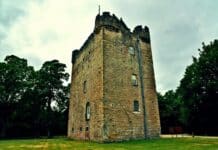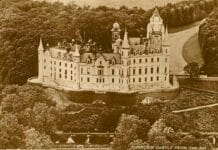MJ STEEL COLLINS reveals the dark legend behind Edinburgh’s Wizard of West Bow
The story of Major Thomas Weir, known also as the Wizard of West Bow or the De’il of West Bow, is one of Scotland’s most famous supernatural legends.
Major Thomas Weir, a strict Covenanter, was born around about 1599 or 1600 in Carluke, Lanarkshire. He had a colourful career in the army before being put in charge of the Edinburgh Town Guard in 1650. Known as one of the Bowhead Saints, the term applied to the particularly devout Presbyterians living in Edinburgh’s West Bow, where Major Weir lived with his unmarried sister Jean, also known as Grizel.
It was during one of those prayer meetings in 1670 that Major Weir scandalized his Presbyterian brethren with a startling confession of incest with Grizel and satanic practices, which the Presbyterian powers that be were keen to hush up. They believed that the Major had gone mad. Curiously enough, if this was the case, it may have been whisperings of the following experience that may have sent Thomas Weir over the edge.
A few nights earlier, one of Edinburgh’s respectable ladies had a terrifying experience when walking by the Weir house with her maid. As they passed the Weir’s door, the bizarre figure of a tall woman, twice the height of a regular woman, emerged before them, cackling and writhing violently.
The weird entity remained one step ahead of the women, before vanishing down a narrow close, which the followers stopped to look down. The alley was lit up with torches and resounded with eerie laughter. No lights were on in the houses themselves. Terrified, the women ran home and told their bizarre story.
The Major and his sister were arrested and taken to Edinburgh Tolbooth. Grizel began indicating her brother’s alleged satanic dealings when the Bailies arrived at the house.
She advised them to take Major Weir’s oft-used black staff, but keep it away from him as it was a gift from the devil and the source of her brother’s powers. At the Tolbooth, she added to what her brother had already stated. She corroborated his confessions, confirming incest. In addition, she accused him of witchcraft, describing how in 1651, he had been picked up in a strange carriage and taken to Dalkeith. During the journey Major Weir was informed by a strange man via supernatural means that the Scots had lost the Battle of Worcester, which had taken place that day.
The Weirs were put on trial. Both were found guilty and sentenced to death, being executed in 1670. It is said that Major Weir was told to pray for forgiveness, but he responded, “Let me alone – I will not – I have lived as a beast, I will die as a beast.” Major Weir was put to death by strangulation and burnt at Gallowlee. An apocryphal tale from the execution concerns the infamous black staff; thrown into the flames with Weir’s body, it writhed as it burned. Grizel’s execution occurred at the Grassmarket.
Following their death, ghostly tales spread thick about Edinburgh, probably fabrications designed to enthral. The house on West Bow lay empty for over a century because it was reputed to be haunted. Although nobody lived there, many people reported seeing lights in the windows, and the sound of revelry, replete with cackling, howling, and ‘the hum’ of Grizel’s evil spinning wheel.
The ghost of Major Weir was supposed exit the small close, astride a headless black horse, and gallop off in a cloud of flame. Thomas Stevenson, a lighthouse designer, and father of author Robert Louis Stevenson, told tales from his childhood where everyone in West Bow was awoken by the sound of the Devil’s carriage arriving outside the cursed house to take Major Weir and Grizel to Dalkeith.







